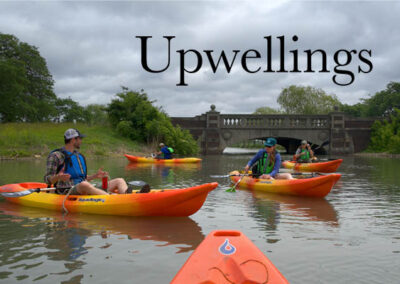By Katrina Lewandowski, 2024 Knauss Sea Grant Marine Policy Fellow
My name is Katrina Lewandowski, a current Knauss Sea Grant Marine Policy Fellow. I’m originally from Bellaire, MI, and am currently finishing up my PhD in Biology and Urban Sustainability at Wayne State University. For the fellowship year, I was placed in the National Sea Grant Office at NOAA working as a Coastal Resilience Specialist.
When I started as an undergraduate at a 4-year university, I had the ideals of becoming a successful researcher and lead scientist. I knew I wanted to ask questions and I wanted those questions to be related to our natural world. What I didn’t know was all the many career paths that I would go down and that would lead me to the Knauss fellowship. I learned some key takeaways during my early schooling and career that will hopefully be helpful for others who are unsure of their next path.

Katrina with a mammoth bone while working as a fossil preparator. Photo: Marcia Lewandowski
It’s okay to change your mind
Following a passion of mine from a young age, I began to take courses in paleontology and started asking professors for volunteer and paid lab work opportunities. After some persistence, I was elated to be a part of the paleontology world, working on prehistoric mammoth fossils and creating molds and casts. However, toward the end of university, I began to take more courses in ecology, conservation, and climate change and felt continuously pulled to these topics. At first I felt disappointed that I would be letting down my friends and new colleagues. But I recognised that it’s okay to have multiple interests, and it’s okay for those interests to change! A factor that helped me decide was looking at job opportunities in each field and imaging what types of those jobs I would be interested in and would be qualified for.

Katrina monitored turtle populations with the Lincoln Park Zoo.
Explore options: there is no timeline
To change pace, I moved to a city and explored my options. I worked jobs in different fields while still searching for connections in an area I was interested in. Through some cold-emailing, I got connected with a team of researchers at a zoo that studied urban wildlife. After volunteering for a few months, an intern position opened up and I started monitoring wildlife around the zoo grounds. Right away, I knew that this position aligned with my future career goals and I felt some relief in my decisiveness that this type of work was a good fit for me. Taking time off school and working multiple jobs allowed me to find the right fit, and ultimately led to my decision to go back to graduate school.

Katrina did field work on the NOAA research vessel Laurentian. Photo: Katrina Lewandowski
Be okay not being The Expert
After three years away from work in academia, I joined a dual program in biology and urban sustainability where I could focus on my interest in ecology and conservation. It was inspiring to learn again and rewarding to understand the details required in scientific investigation and writing. However, as I took classes in transdisciplinary courses, I began to understand the importance of collaboration and non-traditional styles of research. I felt drawn less to becoming the expert within a small niche and more towards bridging gaps and connecting individuals to information from a broader perspective.

Katrina visited Washington, D.C. for an advocacy day trip with the Nature Conservancy. Photo: Katrina Lewandowski
Understand your strengths
My experience in graduate school made me realize where I can fit into the science world: coordination and distillation of science. In teams, I enjoyed bringing everyone together. I was driven more towards activities that allowed me to learn from new perspectives and work with scientists, citizens and nonprofits outside academia. I was further able to understand my strengths in a volunteer capacity with the Nature Conservancy, as a student member on the Michigan Board of Trustees. This opportunity was the first time I was able to experience science communication and its importance in making policy changes.
The Knauss fellowship allows me the opportunity to use my strengths and work in a dynamic environment, and I’m thankful for the chance to experience this new career endeavor. I look forward to sharing more about my experiences over the course of the fellowship year!


